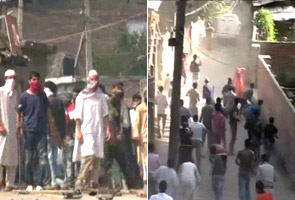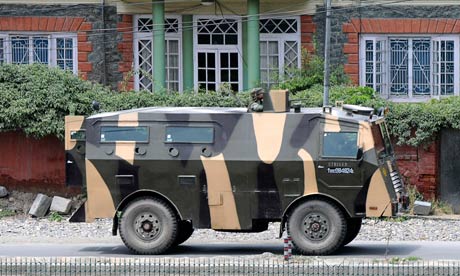
Indian forces opened fire on hundreds of rock-throwing protesters in Kashmir killing three people as authorities re-imposed a curfew in the region's main city amid increasingly violent demonstrations against alleged human rights abuses.
Security forces initially used tear gas to disperse the demonstrators, a police officer said on condition of anonymity because he was not authorized to talk to reporters. When that failed, paramilitary soldiers opened fire with live ammunition, he said.
Fayaz Ahmed Wani, a 35-year-old protester, was killed and two others were wounded, the officer said.
Protests against Indian rule in the Himalayan region have grown increasingly strident in recent weeks with Kashmiri people accusing government forces of killing at least 15 people during street demonstrations. The recent unrest had prompted authorities to impose a curfew in most parts of Kashmir.
As the news of Wani's killing spread, separatist activists in the main city of Srinagar used the public address systems of mosques asking people to join the protest.
"Our protests and civil disobedience will continue until India withdraws its military and paramilitary soldiers from all populated areas," said Mirwaiz Umar Farooq, a key separatist leader who led thousands of marchers in downtown Srinagar.
Carrying black and green flags, the protesters chanted "Go India, go back" and "We want freedom" as they marched through the streets.
The curfew was lifted Tuesday until the latest clashes in Srinagar prompted authorities to enforce it again.
Kashmir is divided between Hindu-majority India and Muslim-majority Pakistan and is claimed by both. Separatist politicians and armed militants in Kashmir reject Indian sovereignty and want to carve out a separate homeland, or merge the predominantly Muslim region with Pakistan.
A young woman was killed when a bullet hit her inside her home in Srinagar. Farooq Ahmed, a senior police officer, said she may have been hit by a stray round.
The woman's death triggered more violent protests with demonstrators clashing with government forces. After trying to quash the crowds with tear gas and warning shots, troops opened fire killing a 16-year-old boy and critically wounding another young man, police said.
Hundreds of protesters then set a police camp on fire.
Five photographers were injured when paramilitary soldiers beat them with sticks and rifle butts during a funeral procession for those killed Tuesday, said Farooq Javed, the president of Kashmir Press Photographers Association. He was among the injured.
Manas Ranjan, a spokesman for the paramilitary Central Reserve Police Force, said officials would investigate the incident.
The latest protests broke out over accusations government forces killed a teenager on Monday.
Police claim Muzaffar Bhat, 17, died after he slipped into a stream by accident.
Resident Abdul Gani said Bhat was playing cricket when Indian paramilitary soldiers beat him with sticks and threw him into the stream.
Also Tuesday, an Indian border guard was killed by gunfire emanating from Pakistani territory. The shooting happened as India's Border Security Force soldiers were returning to camp after patrolling the frontier overnight, said J.S. Oberoi, a border force official.
Oberoi said an investigation was under way to determine whether the soldier was shot by Pakistani guards or by insurgents trying to sneak into the Indian portion of Kashmir from Pakistani territory.
Source http://www.google.com/hostednews/ap/article/ALeqM5jvKA6FSwHfK3D4qLBBHtEDQt5rlwD9GPTAJ01













